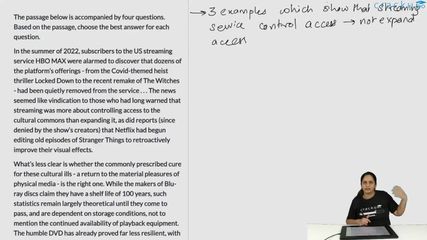Sign in
Please select an account to continue using cracku.in
↓ →
The passage below is accompanied by four questions. Based on the passage, choose the best answer for each question.
In the summer of 2022, subscribers to the US streaming service HBO MAX were alarmed to discover that dozens of the platform’s offerings - from the Covid-themed heist thriller Locked Down to the recent remake of The Witches - had been quietly removed from the service . . . The news seemed like vindication to those who had long warned that streaming was more about controlling access to the cultural commons than expanding it, as did reports (since denied by the show’s creators) that Netflix had begun editing old episodes of Stranger Things to retroactively improve their visual effects.
What’s less clear is whether the commonly prescribed cure for these cultural ills - a return to the material pleasures of physical media - is the right one. While the makers of Blu-ray discs claim they have a shelf life of 100 years, such statistics remain largely theoretical until they come to pass, and are dependent on storage conditions, not to mention the continued availability of playback equipment. The humble DVD has already proved far less resilient, with many early releases already beginning to deteriorate in quality Digital movie purchases provide even less security. Any film “bought” on iTunes could disappear if you move to another territory with a different rights agreement and try to redownload it. It’s a bold new frontier in the commodification of art: the birth of the product recall. After a man took to Twitter to bemoan losing access to Cars 2 after moving from Canada to Australia, Apple clarified that users who downloaded films to their devices would retain permanent access to those downloads, even if they relocated to a hemisphere where the [content was] subject to a different set of rights agreements. Thanks to the company’s ironclad digital rights management technology, however, such files cannot be moved or backed up, locking you into watching with your Apple account.
Anyone who does manage to acquire Digital Rights Management free (DRM-free) copies of their favourite films must nonetheless grapple with ever-changing file format standards, not to mention data decay - the gradual process by which electronic information slowly but surely corrupts. Only the regular migration of files from hard drive to hard drive can delay the inevitable, in a sisyphean battle against the ravages of digital time.
In a sense, none of this is new. Charlie Chaplin burned the negative of his 1926 film A Woman of the Sea as a tax write-off. Many more films have been lost through accident, negligence or plain indifference. During a heatwave in July 1937, a Fox film vault in New Jersey burned down, destroying a majority of the silent films produced by the studio.
Back then, at least, cinema was defined by its ephemerality: the sense that a film was as good as gone once it left your local cinema. Today, with film studios keen to stress the breadth of their back catalogues (or to put in Hollywood terms, the value of their IPs), audiences may start to wonder why those same studios seem happy to set the vault alight themselves if it’ll help next quarter’s numbers.
Which one of the following statements about art best captures the arguments made in the passage?
Option B is the correct answer.
The passage argues that, despite the advances in digital distribution and storage of films (via streaming services or digital purchases), access to art is becoming more fragile. It mentions how content can disappear from platforms, how digital files deteriorate over time, and how rights agreements can limit access based on geographical location. The idea that technology and platform control lead to difficulties in maintaining access captured in Option B
Option A: The passage does not advocate changing the understanding of art as immutable or easily available. Hence, this is wrong.
Option C: This is an overstatement of the passage’s argument. While the passage briefly touches on the idea of retroactive changes to works like Stranger Things, it does not present these changes as inherently "dangerous."
Option D: The passage does not argue for the availability of art in the cultural commons in perpetuity. Instead, it highlights how access is controlled by platforms and technological challenges rather than making a broader ideological statement about cultural commons.

Click on the Email ☝️ to Watch the Video Solution
Create a FREE account and get:
Educational materials for CAT preparation